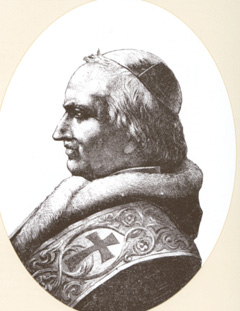 A mild, moderate man, Francesco Xaverio Castiglioni had been the favorite
of the Powers in the conclave of 1823. He was again the favorite in 1829,
and this time he was elected. He chose the name Pius VIII.
A mild, moderate man, Francesco Xaverio Castiglioni had been the favorite
of the Powers in the conclave of 1823. He was again the favorite in 1829,
and this time he was elected. He chose the name Pius VIII.
Francesco Xaverio Castiglioni was born of a noble family at Cingoli on
November 20, 1761. Educated by the Jesuits, he took law at Bologna and
Rome. At Rome he worked with his professor, Devoti, on his book dealing
with canon law. When Devoti became bishop of Anagni, he took his promising
pupil along as vicar-general. Castiglioni later served as vicar-general for
Bishop Severoli of Angoli, an interesting association because in the
conclave of 1823, Severoli was vetoed by Austria in an effort to help
Castiglioni become pope. Bishop of Montalto and later bishop of Cesena,
Castiglioni ran into trouble with the occupying French forces when he
refused to swear allegiance to Napoleon as king of Italy. He was arrested
by the French for his boldness, but after Napoleon's downfall, Pius VII
made him a cardinal and bishop of Frascati.
Pius VIII was a spiritual man of deep conscientiousness. To avoid the least
suspicion of nepotism, he refused to allow his relatives even to come to
Rome. He abandoned Leo's repressive policy in running the Papal States, but
he repeated Leo's condemnations of indifferentism, unauthorized Bible
societies, and secret societies.
Although it lasted for less than two years, the pontificate of Pius VIII
saw some outstanding events. Rome was overjoyed to learn in 1829 that the
great Daniel O'Connell had at last overcome mountains of bigotry and walls
of prejudice to wrest from a reluctant government freedom for British and
Irish Catholics.
Prussia, however, gave the Pope cause to worry. That country on its march
to empire had gobbled up large sections in the Rhineland, Silesia, and
Poland with Catholic populations. It was now trying to prevent children of
mixed marriages from being brought up as Catholics.
Pius, faced with weak German bishops and a bullying government, went to
the utmost limits in concession by allowing priests to assist passively at
mixed marriages in which the proper promises had not been given. But even
this rather amazing concession did not satisfy the Berlin bureaucrats.
Pius was greatly alarmed by the revolutions of 1830. It was only with
reluctance that he brought himself to recognize the revolutionary
government of France's King Louis-Philippe. The revolution in France set up
tremors throughout Europe, but the gentle Pius VIII did not have to worry
about the situation, because on December 1, 1830, he died.
Excerpted from "Popes
Through the Ages" by Joseph Brusher, S.J.

